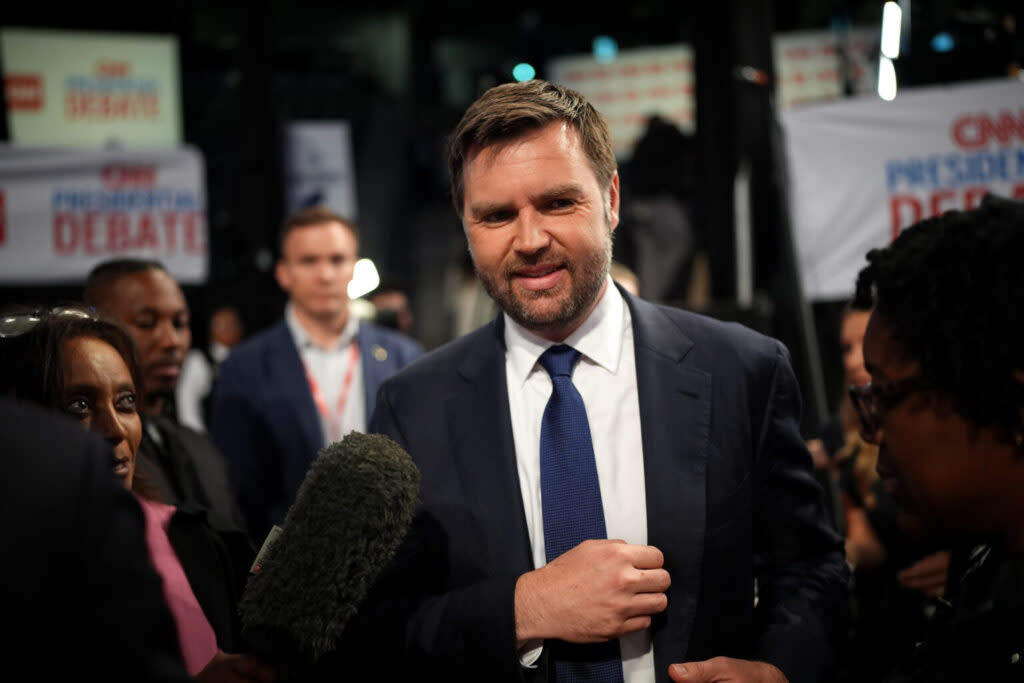JD Vance is making the political debate around parenting weird

- Oops!Something went wrong.Please try again later.
- Oops!Something went wrong.Please try again later.
U.S. Sen. J.D. Vance, R-Ohio, speaks to reporters in the spin room following the CNN Presidential Debate between U.S. President Joe Biden and Republican presidential candidate, former U.S. President Donald Trump, at the McCamish Pavilion on the Georgia Institute of Technology campus on June 27, 2024 in Atlanta, Georgia. Photo by Andrew Harnik/Getty Images.
JD Vance is getting a lot of attention for his remarks he made a couple of years ago attacking Vice President Kamala Harris as a “childless cat lady,” and questioning why we’d let people without children into positions of power.
Let’s skip over the fact that Harris has two stepchildren, that everyone has a stake in our country regardless of their family makeup, and that it’s incredibly stupid politics to insult huge swathes of voters.
If Vance wants Americans to have kids, he should spend less time insulting the childless and more time thinking about how he can use his position of power to make having kids an easier choice. Given how much he cares about this, you’d think he’d support paid parental leave, public investments in child care, and strong public schools, right?
Weird then that Project 2025, which former President Donald Trump pretends to not know about but features Vance as the foreword author, goes in the opposite direction. Their playbook would increase the cost of child care and starve our public schools by siphoning money for the wealthy’s private schools.
Vance could learn a lot from what Gov. Tim Walz and the DFL-controlled Legislature have accomplished in Minnesota in the past two years.
Walz is always prioritizing making this the “best state for kids to grow up.” He and the Legislature worked together to provide universal school meals, paid family leave, increased funding for public schools, and a Child Tax Credit, among many other things. These are all programs that make it easier to be a parent. And we still need more!
I’m an upper-middle class, college educated, white parent of two young boys — among the most privileged positions to be a parent in our country. Yet, my wife and I have found parenting to be surprisingly hard.
With two full-time jobs, we took on a child care payment as expensive as our mortgage. The birth of our second child resulted in a NICU stay and unexpected, ongoing health care expenses. The annual January race to find summer camp options is as competitive and stressful as shoppers charging Target at midnight on Black Friday. I’m writing this while playing with a 6-year old whose summer camp isn’t open on Fridays.
It’s a full-time job to navigate our children’s mental health needs in the convoluted and overloaded behavioral health care system. And we are incredibly fortunate that these are the extent of our challenges. So many parents in our country navigate all of these issues and more, while also struggling to get by with less money and family support.
None of what I just mentioned even touches the most important part of my job as a father: raising my kids to know they’re loved and safe to be whoever they want to be. But all of those stressors make it a hell of a lot harder to be a dad capable of accomplishing that job.
So you won’t be surprised to know that we decided our family is complete with two children.
Each time we considered having another child, we worried about paying for child care, emergency health expenses and housing costs. And we worried longer term about the state of the world that we were bringing kids into.
Parenting is hard. The decision to have kids is intensely personal, and one that shouldn’t be taken lightly. Our political leaders could insult you for your decision and try to bully you into doing what they want. Or they could build public programs that support adults who decide that parenting is right for them.

